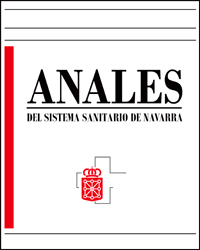Validity of self-reported body mass index in the National Health Survey
Keywords:
Validez, Obesidad. IMC, PesoAbstract
Objective. To assess the validity of self-reported body mass index in the National Health Survey. Methods. 120 participants were selected and questioned about their weight and height with exactly the same questions that the National Health Survey uses. Afterwards, and once informed consent was obtained, participants were weighed and measured, and this data was used as the gold standard. Results. On average, participants underestimated their weight by 1.39 kg, overestimated their height by 0.55 cm and underestimated their body mass index by 0.71 kg/m2. The sensitivity of self-reported self reported body mass index (BMI) to detect overweight was 77%, the specificity was 97%, the positive predictive value was 0.95 and the negative predictive value was 0.86. The Kappa index was 0.76 and the quadratically weighted Kappa index was 0.85. The correlation coefficient between self-reported and measured BMI was 0.96 and the intra-class correlation coefficient was 0.97. Conclusions. Self-reported data is an efficient way of obtaining information about BMI, although with limitations, because self-reported data tends to underestimate weight and overestimate height, thus underestimating BMI and the proportion of participants with elevated BMI.Downloads
Downloads
Published
How to Cite
Issue
Section
License
La revista Anales del Sistema Sanitario de Navarra es publicada por el Departamento de Salud del Gobierno de Navarra (España), quien conserva los derechos patrimoniales (copyright ) sobre el artículo publicado y favorece y permite la difusión del mismo bajo licencia Creative Commons Reconocimiento-CompartirIgual 4.0 Internacional (CC BY-SA 4.0). Esta licencia permite copiar, usar, difundir, transmitir y exponer públicamente el artículo, siempre que siempre que se cite la autoría y la publicación inicial en Anales del Sistema Sanitario de Navarra, y se distinga la existencia de esta licencia de uso.








